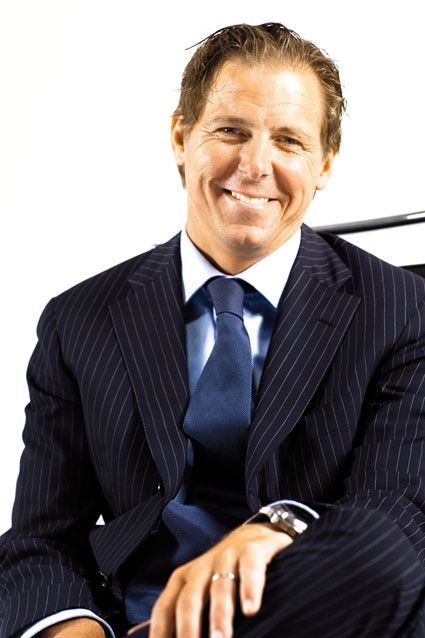Interview with Dr. Magnus Ekerot, New Chief Sales Officer (CSO) of Mobotix
More responsibility and more influence - that was what Dr. Magnus Ekerot, formerly Managing Director at the Swedish display manufacturer Beijer Electronics as well as with Axis Com...

More responsibility and more influence - that was what Dr. Magnus Ekerot, formerly Managing Director at the Swedish display manufacturer Beijer Electronics as well as with Axis Communications, was looking for. It was opportune then that Dr. Ralf Hinkel of Mobotix was on the lookout for a new CSO. GIT-SECURITY.com spoke with Dr. Magnus Ekerot about the reasons for his move and his plans with Mobotix.
GIT-SECURITY.com: Dr. Ekerot, we just have to start with the question of what drove you to take over responsibility at Mobotix after your time with Axis Communications and Beijer Electronics?
Magnus Ekerot: Yes, of course you can ask because the question is easy for me to answer. I wanted more responsibility. I was Managing Director with Beijer Electronics worldwide in an international listed company and was a member of the Board. At Axis I was Regional Manager for the German-speaking countries, the Netherlands and Eastern Europe. So it was an important personal step for me to move to Beijer Electronics. I didn‘t just want to be responsible for various regions but to actively influence a company. I was with Beijer for two years and didn't have any intention to move until Dr. Hinkel contacted me. He made me an offer to become CSO at Mobotix with the option of assuming the CEO position in the mid-term so that he himself could concentrate more on the research and technology side of the company. That sounded exciting, because I know the market and have a strategic and international background through my previous activities. It was important that I would not join a company whose business and organizational structure was identical to one of my previous employers.
What attracted you particularly of Mobotix?
Magnus Ekerot: Above all it is the high level of innovation and the continuing large potential for the growth of Mobotix that fascinated me. What attracts me is that not only IP video technology is considered but complete solutions and thereby an expansion in my area of activity is possible. In comparison to other competitors in the camera market, Mobotix is not just a pure manufacturer of cameras but a broadly-based system and software provider that has set numerous technological trends in the industry over recent years. The company founders, Dr. Ralf Hinkel, his management team and all the employees have achieved a great deal here. They have applied high-resolution and network-based video systems as well as their decentralized Hires Mobotix concept. And that is just the beginning. Besides the new technology approach and the parallel international expansion, the company has most recently managed to secure a new market segment in access control and IP door stations with its hemispheric camera technology. We expect further growth opportunities to arise in the coming years - in particular because the technology also permits the future integration of iPhone and iPad. There are therefore some challenging tasks ahead with which I want to apply myself.
Music is one of your hobbies. If you were to compare Mobotix and Axis as if they were bands, which company is which band and why?
Magnus Ekerot: That‘s a great question, one that I‘ve asked for the first time actually, and it‘s also one which is pretty difficult to answer. I love music, although it‘s not easy to compare companies with music. But okay, let‘s take the nationality as a basis: Axis would then be comparable to Abba. Many people were and is wowed by Abba, the music is well composed, the group had and still has fans in many countries, it is still popular, they look good (or at least they did) - just as it usually is in Sweden, to put it simply. Mobotix, on the other hand - and I‘m exaggerating here somewhat - is more like Rammstein. It takes a while before everybody understands Rammstein. This band has its own music concept and fans that are totally convinced and are therefore very loyal. Rammstein is not yet so big, but ever more people understand their music, discover the unique concept that lies behind it and are then enthusiastic.
You have been Chief Sales Officer on the Board of Mobotix since January 2011. What personal elements and what company philosophy have you brought with you in your opinion?
Magnus Ekerot: For me, a company that functions well in all respects is important. The first few months were therefore dominated by listening and analyzing. Simultaneously I was able to become familiar with the technology of the company. And now - I believe - I have the foundation to move sales forward in the interests of Mobotix and to expand and make it even more efficient. My character and my competence, that I have now enhanced with company-specific I believe, fit very well together to bring the company further towards our vision and objectives. I am convinced that I harmonize well with the existing components here, and I mean that in spite of enormous growth and worldwide expansion, Mobotix has kept its entrepreneurial spirit and the advantages of a family-run company: there is a very open atmosphere here with flat hierarchies and decision-making processes; everybody is pulling in the same direction. From that point of view, the company philosophy is right for today and also for the future challenges that this successful publically listed company will meet.
Can you see the first results?
Magnus Ekerot: Oh yes, the results are definitely positive. The first months were characterized by many conversations held with the employees in development, production and sales as well as with our partners and end-users. I wanted to get integrated in the company structure and get an overview as quickly as possible. In addition I already visited eight national partner conferences worldwide in the first few months and was on site at numerous customer projects.
Mobotix is "innovative technology motor of network camera technology". Once more for clarity and for all readers who are new to the subject: why do you think only the ‘decentralized concept‘ enable high-definition video systems to be economic?
Magnus Ekerot: Here I really do have to go into some background detail and also consider the market development. The video security industry has been going through a significant churn for some years now, initiated by demand for higher resolution when recording images. In contrast to digital cameras that already today have up to 15 megapixel resolution, most of the usual analog cameras that are based on a more than 50 year old television standard save their images with a resolution of only 0.1 megapixel. A modern mobile telephone, for example, with integrated megapixel camera can store 30 times more detail in the image than most of the security cameras that are in use worldwide. That all changed with the advent of network cameras - finally the image format was not dependent upon the method of transmission because, just like in the internet, small pictures as well as high-definition megapixel images can be transported over one and the same network cable. The significant advantage of network cameras therefore lay more in the ability to transmit images throughout the company or worldwide via the internet. But there was a catch with network cameras, however, because the images couldn‘t be transmitted raw but had to be compressed because of the limited bandwidth of the network. This was not rocket science with the compression chip in the camera, but the problems began at the other end of the cable at the PC: the video management software suddenly had to cope with an additional decoding load, which led to enormous computing times. What was simple for one camera became a growing problem for a dozen cameras so that only small images at low frame rates flickered on the PC monitors. It was common, for example in a casino, where the imaging had to be at 30 frames per second with 480 TV lines, for only two or four cameras to be displayed and controlled from each PC. So it‘s no surprise that this type of video recording was expensive and required large, costly servers.
And that is where the decentralized concept comes into play?
Magnus Ekerot: Right. To solve this problem, we apply a decentralized Mobotix concept that distributes the load between the cameras and the video management software. Each camera has a high-power processor and can be fitted with a digital long-term flash memory (micro SD-card) if required to make multiple day recordings. The PC or the video control center serves purely to observe and control the cameras (PTZ) but not to evaluate or record. This obviates the need for an overloaded and expensive video management software as the significant and computer-intensive functions are already contained in the Mobotix cameras. Ten times as many digital network cameras can be recorded on a PC with this system as with analog cameras, and that with a significantly higher resolution. In addition, bandwidth variations and network failures are bridged by buffering the video data in the camera. A further advantage: new megapixel systems are cheaper, because one single camera can cover a much wider area than an old analog camera because of its higher resolution. The decentralized system design in conjunction with higher resolution, intelligent software in the cameras and video management software for the PC together make Mobotix a system provider.
Your company primarily manufactures megapixel cameras, but you‘ve delved into a new market environment with your IP video door station. How does this market work for Mobotix?
Magnus Ekerot: Mobotix uses the existing hemispherical technology with its in-house developed T24 IP video door station to get a foot into this new but closely-related market for access control and door stations. When the bell is rung, a connection is made over the network to a VoIP telephone, PC or iPhone/iPad so that the door station can in principle be served from any location worldwide and the door opened. With the hemispherical door station, we provide a complete solution for the growing market of intelligent household control and building automation. The integration of iPhone and iPad will play a big role. I‘m therefore convinced that the new product division will have a large part in the further growth of the company. Our partners and customers are definitely showing great interest. According to the data from various market research institutes, the expected growth of IP door stations for the next three to five years lies at more than 100%. I can remember that the prognosis for market growth of IP cameras in 2004/2005 was around 40%, which was already terrific. The new market gives us the ability to speak to new customer segments, such as electricians and installers, for example, as well as new end customers. I‘m sure that we will sell more cameras this way as door station technology is also highlighted by the decentralized concept and fits perfectly in our total system.
What are currently the biggest growth drivers at Mobotix? Which products are selling particularly well and which are gaining market share?
Magnus Ekerot: Our current ‘star‘ of the solutions palette is the hemispherical Q24 - an elegant, compact and weatherproof hi-res IP dome camera. A further growth product is a classic, the M12 camera. This dual camera with two separate hi-res image sensors has been sold worldwide more than 100,000 times. And of course, not to be forgotten, the M24 family. This is our economic, extremely powerful all-round camera and most suitable for starting out in video security.
What important reference projects can you tell us about right now?
Magnus Ekerot: Unfortunately we can‘t tell you about the largest projects, but I can tell you that we have reference projects worldwide with the most varied and interesting applications. One of our new customers, for example, is the Vatican. There our cameras survey the Vatican-Apostolic library. A further unusual application is the Donbass Arena, the first eastern European football stadium that meets the UEFA criteria for an elite stadium. The arena is an important venue for the European football championship next year. 528 high-resolution network cameras have everything in view. The video system will on the one hand enable the identification of all people during entry, their time in the stadium and when leaving. On the other hand it will be used to observe and control the flow of fans at the entrances and exits and the entry points to the stands.
In your opinion, what will be the greatest challenge for Mobotix, but also for the security industry in general in the next few years?
Magnus Ekerot: For Mobotix the challenge will be to maintain a controlled growth - and that through internationalization as well as the creation of new markets, such as has happened recently with our door station - but without neglecting our core business and our high quality standards. Because of the high demand for our products abroad, we will be further expanding, training and supporting our partner network. I have been surprised that the churn from analog to digital technology hasn‘t progressed further over the last two years. One of the most important challenges then for the entire security industry is in my opinion to finally throw the more than 50 year old analog video standard overboard. Then why don‘t traditional camera manufacturers also simply fit high-definition sensors in their video cameras? The answer is simple but unsatisfactory for end-users: because the fundamental video standard is 50 years old and the transmission of high-definition images is not possible over the video cable. In effect, an entire industry has been technically overwhelmed because surveillance that doesn‘t deliver sharp images is pointless. The discussion about the future of video surveillance should not just be about quantity, but also about quality. Just increasing the density of cameras at railway stations and airports will not bring the required result. An upgrade should also, and above all, mean a qualitatively improved video surveillance. This consequently means that the image quality of the systems will be further improved. This allows not only cost-effective solutions to be found but more suitable evidential images become available that can actually be used without limitation for identification of suspects.
When will Magnus Ekerot be the sole CEO of Mobotix?
Magnus Ekerot: Please, give me a chance, I‘ve only been on board for six months. Dr. Ralf Hinkel remains Chief Executive Officer (CEO). He wishes however to gradually concentrate more on strategic product development and thereby to open up new markets for Mobotix. It is planned that he will hand over the tasks of the CEO in the mid-term.
Dr. Ekerot, thank you for the conversation.














